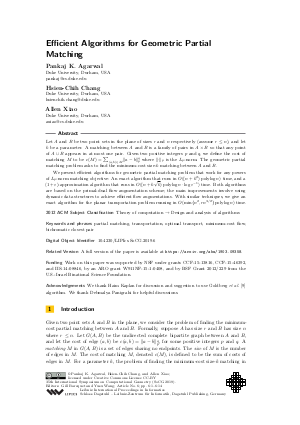@InProceedings{agarwal_et_al:LIPIcs.SoCG.2019.6,
author = {Agarwal, Pankaj K. and Chang, Hsien-Chih and Xiao, Allen},
title = {{Efficient Algorithms for Geometric Partial Matching}},
booktitle = {35th International Symposium on Computational Geometry (SoCG 2019)},
pages = {6:1--6:14},
series = {Leibniz International Proceedings in Informatics (LIPIcs)},
ISBN = {978-3-95977-104-7},
ISSN = {1868-8969},
year = {2019},
volume = {129},
editor = {Barequet, Gill and Wang, Yusu},
publisher = {Schloss Dagstuhl -- Leibniz-Zentrum f{\"u}r Informatik},
address = {Dagstuhl, Germany},
URL = {https://drops.dagstuhl.de/entities/document/10.4230/LIPIcs.SoCG.2019.6},
URN = {urn:nbn:de:0030-drops-104109},
doi = {10.4230/LIPIcs.SoCG.2019.6},
annote = {Keywords: partial matching, transportation, optimal transport, minimum-cost flow, bichromatic closest pair}
}

 Creative Commons Attribution 3.0 Unported license
Creative Commons Attribution 3.0 Unported license

